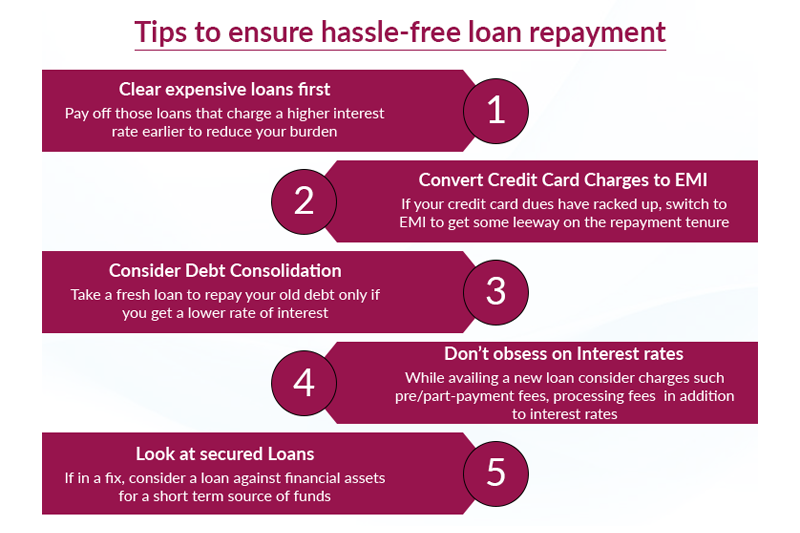2 MinsApril 20, 2020
Repaying a loan may be the last thing on your mind if you are facing any kind of financial stress.
But missing an EMI or defaulting on your loan can have a long-term impact. The negative impact
stays on your credit report for two to three years
and can affect your chances of borrowing in the future. Hence, you must not miss a single
repayment.
If you are facing a cash flow problem here are a few things to keep in mind.

1. Pay off expensive loans first
If you have more than one kind of debt, say
credit card outstanding and personal loan and are finding it difficult to repay both
simultaneously, pay off the more expensive loan first. While
both are unsecured loans, the interest rates on credit cards can be as high as 40-45%, depending
on the tenure. While for a Personal
Loan the rates range between 12 and 24%.
You may be tempted to pay off your personal loan as it could be of a longer duration than your
credit card dues. But remember, the interest charges on credit cards can add up to a tidy sum if
left unpaid.
2. Convert credit card outstanding into EMI
If you have run up a huge credit card outstanding you can convert it into an
EMI and repay it monthly. In this case, the rate of interest
will be lower than if you only pay the minimum amount due and carry forward the remaining
outstanding. The bank will also charge you a processing fee for converting the outstanding into
EMI and your credit card limit will be reduced to that
extent until it is paid off in full.
3. Consolidate your debt
Taking a fresh loan to repay an existing loan may not
seem like a good idea. But if your cash flow is under stress, this could be a good option. You
can either transfer your credit card balance to
another card which charges a lower rate. Or you could avail of a personal loan and repay your
credit card loan since the interest rates on personal loans are lower.
[Also Read: Things
to Know Before You Prepay Your Home Loan]
4. Compare all costs and not just interest rates
When you avail of a personal
loan, check the charges on pre-payment and processing fees in addition to interest rates, as
these will also add to your cost. The bank where you
have your salary account may offer you a loan faster, as you may not need to undergo the
verification procedure. But do compare both cost and convenience before zeroing in on the bank.
For instance, Axis Bank does not charge a pre-payment
penalty on personal loans.
5. Look at secured loans
You can even look at a loan against FD and other financial investments such as Debt
or Equity Mutual
Funds, Equity Shares, Listed Bonds, Life Insurance Policies and gold. These being secured loans,
the interest rates are lower than on personal loans,
in the range of 10 to 14%. Besides, you won't need to sell or redeem your investment completely.
But if you need a large amount, these loans may not be suitable as the amount is restricted to a
certain percentage of your investment value.
Keep track of your loan repayment by checking your credit score and report regularly. You can get one
free credit report from the credit bureaus in a year. Use this facility to your advantage to
maintain your track record.
Disclaimer: This article is for information purpose only. The views expressed
in this article are personal and do not necessarily constitute the views of Axis Bank
Ltd. and its employees. Axis Bank Ltd. and/or the author shall not be responsible for
any direct / indirect loss or liability incurred by the reader for taking any financial
decisions based on the contents and information. Please consult your financial advisor
before making any financial decision.











